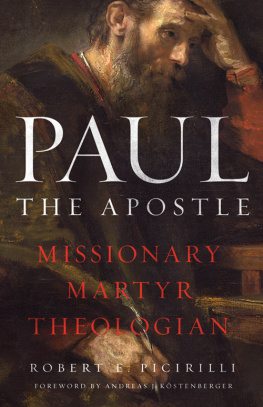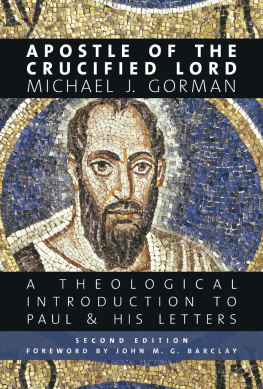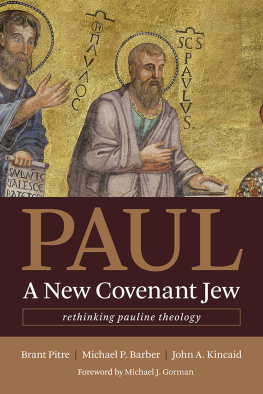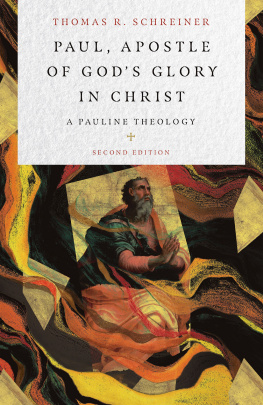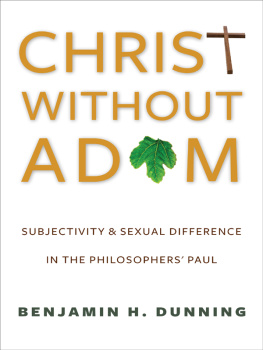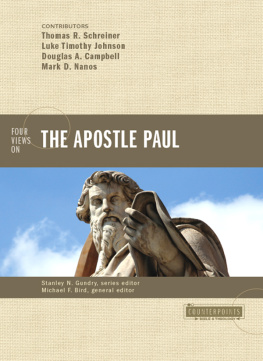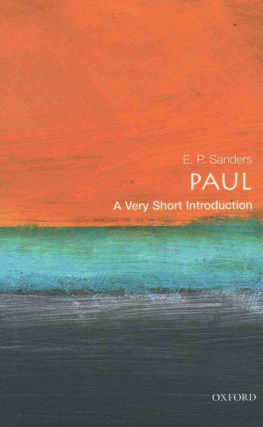Pauline Ugliness
Series Board
James Bernauer
Drucilla Cornell
Thomas R. Flynn
Kevin Hart
Richard Kearney
Jean-Luc Marion
Adriaan Peperzak
Thomas Sheehan
Hent de Vries
Merold Westphal
Michael Zimmerman
John D. Caputo, series editor


Copyright 2020 Fordham University Press
All rights reserved. No part of this publication may be reproduced, stored in a retrieval system, or transmitted in any form or by any meanselectronic, mechanical, photocopy, recording, or any otherexcept for brief quotations in printed reviews, without the prior permission of the publisher.
Fordham University Press has no responsibility for the persistence or accuracy of URLs for external or third-party Internet websites referred to in this publication and does not guarantee that any content on such websites is, or will remain, accurate or appropriate.
Fordham University Press also publishes its books in a variety of electronic formats. Some content that appears in print may not be available in electronic books.
Visit us online at www.fordhampress.com.
Library of Congress Cataloging-in-Publication Data
Names: Lland, Ole Jakob, author.
Title: Pauline ugliness : Jacob Taubes and the turn to Paul / Ole Jakob Lland.
Description: First edition. | New York : Fordham University Press, 2020. | Series: Perspectives in continental philosophy | Includes bibliographical references and index. | Summary: Jacob Taubes radically changed our conceptions of Paul the apostle. Loland shows how we can approach Pauls letters with the distinctive perspective of this Jewish rabbi steeped in continental philosophy. This book emphasizes Pauls Jewishness as well as the political explosiveness of the apostles revolutionary doctrine of the cross, which the author terms Pauline UglinessProvided by publisher.
Identifiers: LCCN 2019028526 | ISBN 9780823286553 (hardback) | ISBN 9780823286546 (paperback) | ISBN 9780823286546 (epub)
Subjects: LCSH: Bible. Epistles of PaulCriticism, interpretation, etc. | Paul, the Apostle, Saint. | Taubes, JacobInfluence. | Philosophical theology.
Classification: LCC BS2650.52 .L65 2020 | DDC 227/.06dc23
LC record available at https://lccn.loc.gov/2019028526
First edition
Contents
Pauline Ugliness
One of the remarkable features of the present time is the dramatic rediscovery and reactivation of Paul not so much, as one might imagine, within the church, but outside of it, or on its very edge, in the whole raft of continental philosophers, of whom Slavoj iek and Alain Badiou are perhaps the best known.
John M. G. Barclay, Paul and the Philosophers: Alain Badiou and the Event
The biblical scholar John M. G. Barclay is one of those who have highlighted the drama in the turn to Paul in recent continental philosophy. To sustain the notion of drama in these academic circumstances Barclay pointed to the rediscovery of Paul outside the apostles traditional religious reading circles. Indeed, a philosopher like Alain Badiou assured his readers that Paul could be reclaimed for wholly secular purposes. Moreover, the allegedly secular concern in Badious readings of the Pauline epistles appeared not only to be a sensational reactivation of Paul but also aimed at reinventing the political left. Given that radical leftist philosophers such as Slavoj iek and Giorgio Agamben felt the need at the turn of the the millenium to reactivate the apostles legacy, we were left with the impression that Paul was somehow indispensable or necessary for this kind of philosophical radicalism. Paul appeared to be one of the figures that united them in a common philosophical movement: Here appeared a group of leftist-oriented philosophers who turned to Paul simultaneously and engaged in a common interrogation of the apostles relevance for contemporary politics. Among the other figures that united their philosophical orientations were Marx, Freud, and Nietzsche. In other words, Paul became woven together with so many modern intellectual figures, including the three pillars of modern critical theory. Paul the apostle is nowadays, at least potentially, also a name for critical theory. This foundational figure of early Christian religion has been made into one of the contemporary symptoms of the blurring of the religious-secular distinction.
How did this come into being? And how is the Pauline legacy refigured in light of this recent philosophical interest?
One of the ways to answer these two questions is to introduce the absent four in this list of philosophers that at some point turned to Paul: Jacob Taubes (192387) was a Jewish rabbi who worked as a philosopher in various universities in the United States, Israel, and West Germany until he died in 1987. Barclay may be right that Badiou and iek are the best known, but the commentaries and secondary literature about Giorgio Agambens The Time That Remains have also been massive. Nonetheless, Taubes may be regarded as a forerunner to all three. As a leftist activist and thinker within the continental philosophical tradition he was the first of them, with his lectures on Paul from 1987, published as The Political Theology of Paul . Why was it difficult to include Taubes within the main discussions about philosophy and religion? What made Taubess Paulinism resistant toward such integrations? In order to explain this, it is necessary to investigate the origins of Taubess Paulinism, particularly with regard to the disciplinary boundaries that define philosophy as distinctive and different to history. Hence, there is a need to discern the method that is operative in Taubess approaches to Paul. And we may ask: How can we understand Pauls texts on the background of Taubess readings of them?
Pauline Ugliness is a notion that surges in Taubess works through an explicit and deliberate transgression of the boundaries set between history and philosophy. It comes to fore in an essay from 1968 entitled, The Justification of Ugliness in Early Christian Tradition. Here Taubes declares that the aphorisms and polemics of the philosopher Friedrich Nietzsche contain a historical insight that remains unsurpassed by the New Testament exegetes. In other words, the experts of historial criticism within modern biblical scholarship have yet to see what Nietzsche saw: Pauls doctrine of the cross as foolishness in the First Epistle to the Corinthians 1:20 constituted no less than a transvaluation of the religious, ethical, and aesthetic values of Antiquity. This text is where the conflict between the slave morality and the noble morality first appears, according to Nietzsche, and Taubes agrees with the polemical philosopher. He praises Nietzsches historical knowledge and devalues the claims made by the historical and exegetical experts. According to Taubes, the historians have not perceived the deadly conflict that goes through the history of the West in what is considered Nietzsches true version of it, between the ugliness of the cross of the oppressed and the aesthetic beauty of the aristocracy.
The Justification of Ugliness in Early Christian Tradition was written by Jacob Taubes for the research group Poetik und Hermeneutik in 1966. His readings effected not only a blurring of the dichotomy between the religious and the secular, but also of the powerful historical-philosophical distinction.
If we are to understand how Taubes contributed to the recent philosophical turn to Paul, we also need to pay close attention to how notions of the historical and philosophical function in Taubess reception of Paul. To analize this particular form of reception it is necessary to clarify the function of the various and complex layers of reception that produce Taubess Paul. This variety and complexity can be analyzed and viewed through the careful work of the genealogist.
Next page

